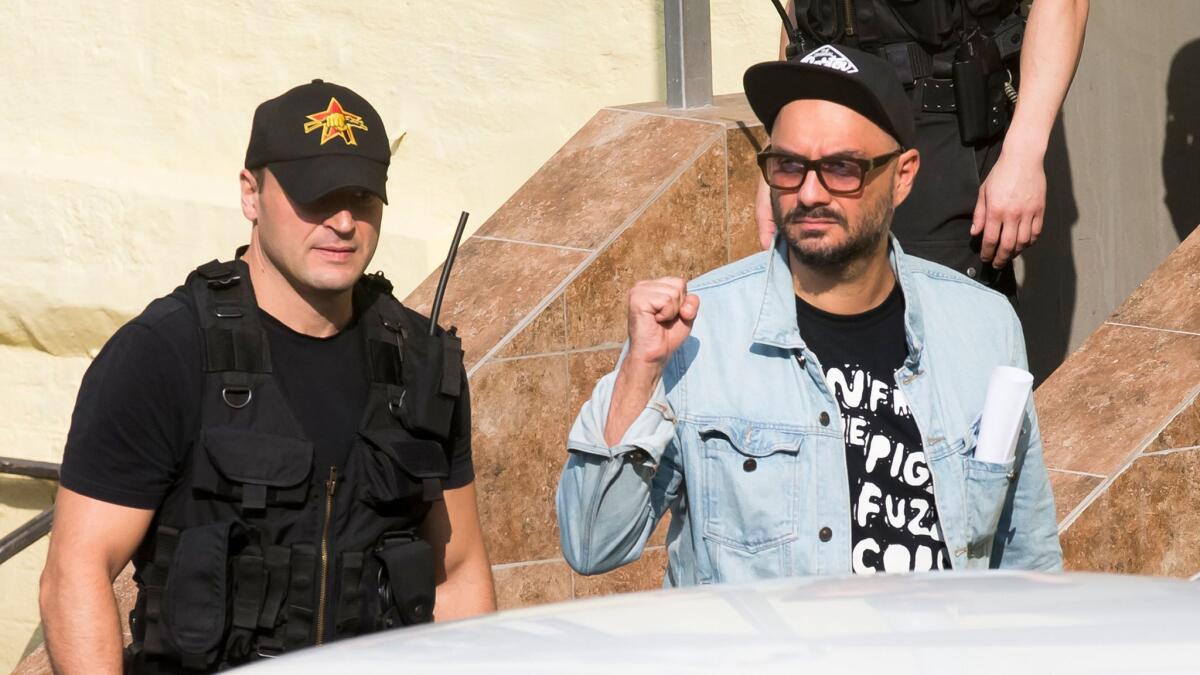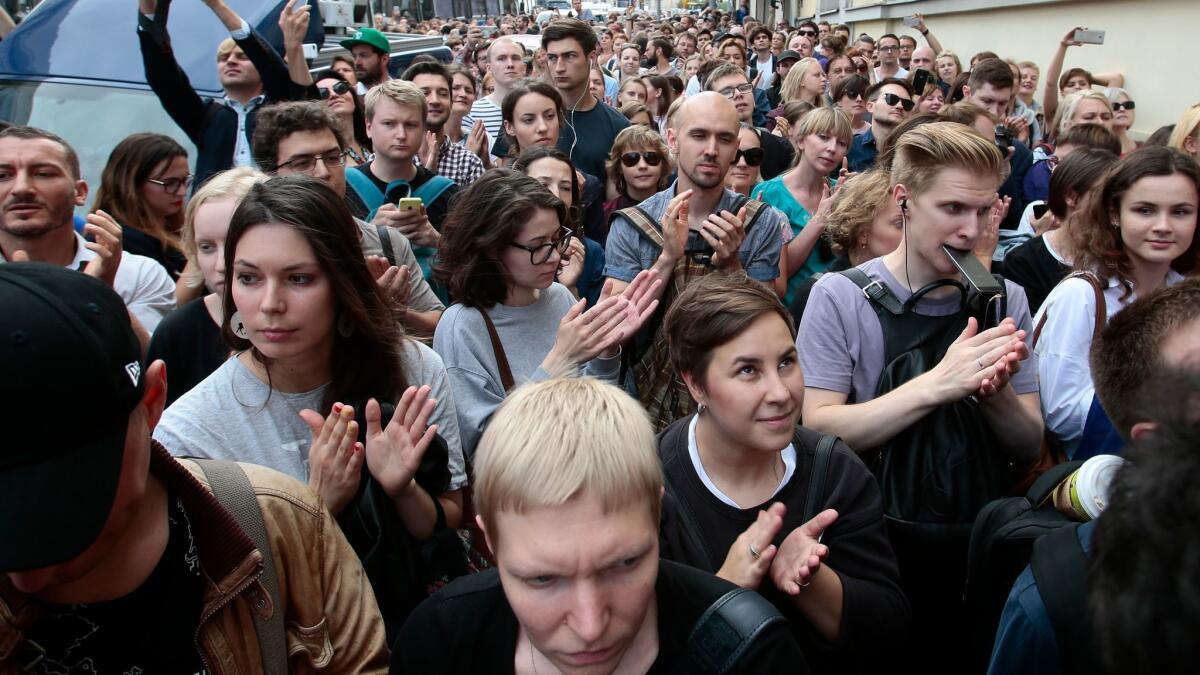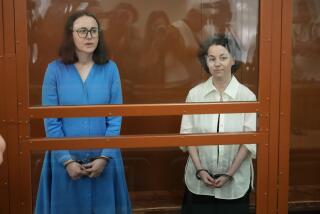Revered Russian theater director placed under house arrest, raising fears of a crackdown on dissent

Reporting from Moscow — A Moscow court on Wednesday placed a prominent theater director under house arrest in an embezzlement case his supporters and several leading cultural figures called the most serious step toward repression of artistic expression in Russia since the Soviet Union.
Kirill Serebrennikov, the director of Moscow’s Gogol Center, is widely known in Russia for his avant-garde plays, movies, operas and ballets, which frequently comment critically on modern Russia’s political and social landscape under President Vladimir Putin.
He is charged with misappropriating 68 million rubles, or $1.1 million, in government funds allocated for theatrical productions from 2011 to 2014. Serebrennikov denied the charges in court, saying the funds were used to produce “big and bright” theater productions.
Serebrennikov’s experimental theatrical performances and productions have become widely popular in Russia and received international acclaim. His plays and productions frequently push the boundaries with their criticism of authoritarianism and challenge the Kremlin’s increasingly conservative rhetoric about Russia’s traditional values and differences with Western liberalism.
In July, Moscow’s famed Bolshoi Theater postponed the opening of a ballet about Rudolf Nureyev that Serebrennikov was directing. Russian news media speculated that the ballet came under scrutiny from conservative Kremlin eyes for including homosexual themes in its telling the story of one of Russia’s most revered ballet dancers.
Serebrennikov’s movie “The Student,” about a young man who turns to religious extremism to find meaning to his life, won a special prize at the 2016 Cannes Film Festival.

On Tuesday, police detained Serebrennikov, 47, in St. Petersburg, where he was working on a film about legendary Soviet rock star Viktor Tsoi. He was transferred to Moscow, where he was formally accused of large-scale fraud and placed in a detention center.
The Investigative Committee, which is Russia’s equivalent to the FBI, urged the court to place Serebrennikov under house arrest for two months before he stands trial on Oct. 19.
If convicted, Serebrennikov faces up to 10 years in prison. Three other employees of the Gogol Center — its general director, chief producer and accountant — have also been charged with fraud in a scheme investigators say they used to embezzle government funds meant to support theater productions.
One of those productions was Shakespeare’s “A Midsummer Night’s Dream,” which ran for two months in 2012 at the Gogol Center. Investigators, however, asserted that the production never happened, even though the play received rave reviews and award nominations. Investigators rejected the reviews and photos taken by audience members and posted online, saying they could have been written by anyone.
Culture Minister Vladimir Medinsky said the situation around Serebrennikov was “very regrettable.” Medinsky, who has questioned why the government provided funding for Serebrennikov’s work, rejected suggestions that the Kremlin was prosecuting the director as a warning to outspoken artists. “I know for sure that it is not custom-made,” Medinsky said of the charges.
At the heart of the case against Serebrennikov is a struggle between two diverging camps in Russia that see the country’s future going in opposite directions, said Alexander Baunov, senior fellow at the Carnegie Moscow Center.
On one side are those who want Russia to move toward a modern society with a strong economy and a cultural scene able to compete with the rest of the world, Baunov said.
“He is a troublemaker in the sense that he makes modern theater, he is a freethinking, talented artist,” he said. “There are people for whom he represents the future way of Russian culture and the Russia as they want to see.”
But there are those in power, as well as in a large segment of Russian society, who are nostalgic for a country they remember from Soviet times, when culture and arts were interpreted from a classical, academic viewpoint and Russia was guided by a strong military and leadership, he said.
“To these people, Serebrennikov represents the danger of the West, which wants to undermine the specific Russian way of life, its traditional values and its sovereignty,” Baunov said.
Journalist Yulia Latynina wrote in a sobering commentary in Novaya Gazeta, one of Russia’s last remaining independent news outlets, that the last time Russia detained such a high-profile director was in 1939 when Vsevolod Meyerhold, an experimental theater director, was arrested and later executed during Josef Stalin’s Great Purge.
Outside the Basmanny District Court in central Moscow, hundreds came out to support Serebrennikov as a judge placed him under home arrest. Many gathered in the street by the courthouse said Serebrennikov was being persecuted for his liberal, freethinking artistic expression by an increasingly authoritative Kremlin seeking to eliminate dissent ahead of next year’s presidential election.
“This is a preelection move,” said Viktor Shenderovich, an actor, satirist and radio host who joined the demonstration outside the courthouse and called Serebrennikov one of Russia’s most talented artists.
“It’s a clear signal to the artistic community: Leave Russia, or fall in line and support Putin,” Shenderovich said.
Serebrennikov was targeted even though he may not be Russia’s most outspoken or provocative representative of the cultural elite, said Masha Basyrova, 30.
“I think the government is trying to show us that anyone could be arrested,” she said. “They want us to know that we’re all being watched.”
Twitter: @sabraayres
Ayres is a special correspondent.
ALSO
In St. Petersburg, a stalwart of the 1917 revolution lives on: The communal apartment
A Mexican reporter was in a program to protect journalists. He was still killed
In India, you can no longer divorce a woman simply by saying (or texting) it three times
More to Read
Sign up for Essential California
The most important California stories and recommendations in your inbox every morning.
You may occasionally receive promotional content from the Los Angeles Times.











